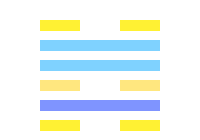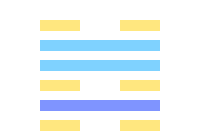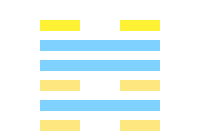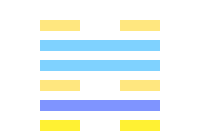47.1.2.6 (47 > 25)

47.1.2.6 (47 > 25) - THE KHWĂN HEXAGRAM.
- 1. The first line, divided, shows its subject with bare buttocks straitened under the stump of a tree. He enters a dark valley, and for three years has no prospect (of deliverance).
- 2. The second line, undivided, shows its subject straitened amidst his wine and viands. There come to him anon the red knee-covers (of the ruler). It will be well for him (to maintain his sincerity as) in sacrificing. Active operations (on his part) will lead to evil, but he will be free from blame.
- 6. The sixth line, divided, shows its subject straitened, as if bound with creepers ; or in a high and dangerous position, and saying (to himself), ‘If I move, I shall repent it.’ If he do repent of former errors, there will be good fortune in his going forward.
47.1.2.6 (47 > 25) - The embarrassment
One is too shrewd to accept such foolishness.
Bing DeepL Google Yandex47.1.2.6 (47 > 25) - The embarrassment
One is too shrewd to accept such foolishness.
Bing DeepL Google Yandex47.1.2.6 (47 > 25) - K’uán, la détresse
K’uán : détresse, abattement, dureté, sévérité, mauvais traitements.
- 1. Un homme pressé contre le pied d’un arbre, poussé dans une caverne obscure, ne pouvant pendant très longtemps (litt. : 3 ans) voir personne à qui recourir.
- 2. Cet homme est dans la détresse quant au boire et au manger. Mais tout à coup apparaît la couverture rouge (du char du roi) (ou le secours), il est délivré, il pourra offrir des dons et sacrifices, il châtiera les méchants sans éprouver de dommage. [La ferme droiture est digne d’éloges. Com. II.] L’arrivée du roi ou des gens le sauve.
- 6. Un homme en détresse, pris dans des buissons épais, sur une hauteur exposée aux dangers et qui se dit : si je bouge, je le paierai cher. [Quand on éprouve le repentir, on peut corriger le mal et alors on sera heureux. Com. II.].
47.1.2.6 (47 > 25) - La gêne
On est trop perspicace pour accepter de telles étourderies.
Bing DeepL Google Yandex47.1.2.6 (47 > 25) - Kényelmetlenség
- 1. Felhagy az ügyeivel egy időre mert nem látni semmit.
- 2. Nem vár semmit, amikor egy váratlan látogató lehetővé teszi hogy felülvizsgálja ítéleteit.
- 6. Nem akarja folytatni de sikeres lehet.
The trigrams
The trigrams are combinations of three yin and yang lines. The three bottom lines of the hexagram form the lower trigram and represent the inner situation. The three top lines form the upper trigram and represent the outer situation.
Upper trigram: The lake The sky


Lower trigram: The water The thunder


The formation: 47
What is already there

47 - THE KHWĂN HEXAGRAM.
In (the condition denoted by) Khwăn there may (yet be) progress and success. For the firm and correct, the (really) great man, there will be good fortune. He will fall into no error. If he make speeches, his words cannot be made good.
Bing DeepL Google Yandex47 - The embarrassment
Circumstances or appearances play against one. Justifying oneself is useless, one will be understood later.
Bing DeepL Google Yandex47 - The embarrassment
Circumstances or appearances play against one. Justifying oneself is useless, one will be understood later.
Bing DeepL Google Yandex47 - K’uán, la détresse
K’uán : détresse, abattement, dureté, sévérité, mauvais traitements.
K’uan « détresse, abattement (dureté, sévérité) ». Celui qui, dans le danger, ne perd pas son principe de développement et qui en détresse même est encore calme et content, c’est l’homme vraiment grand (kiun tzè). Mais d’abord il peut commettre quelque erreur, tomber en détresse s’il se fie à toute parole ; qu’il ne le fasse pas, car la parole est peu sûre.
Texte
Droit et ferme, le grand homme sera heureux. Qu’il ne se fie pas à tout ce qu’on lui dit. — K’uán est le fort saisi, emprisonné, en détresse.
Symbolisme
Marais sans eau, cela figure la détresse. — Le sage expose même sa vie pour atteindre son but.
Commentaire
K’uán est celui qui est dans la détresse, le danger. Si alors même, il ne perd pas sa grandeur d’âme, c’est vraiment un grand homme. L’homme grand prospère s’il reste fermement vertueux. Mais qu’il ne se fie pas aux dires ; les estimer hautement, c’est s’exposer à sa perte.
47 - La gêne
Les circonstances ou les apparences jouent en notre défaveur. Se justifier est inutile, on sera compris plus tard.
Bing DeepL Google Yandex47 - Kényelmetlenség
A körülmények vagy a kinézet negatív szerepet játszik. Magyarázni felesleges, később meg fogjuk érteni.
Bing DeepL Google Yandex
47.1 (47 > 58) - THE KHWĂN HEXAGRAM.
The first line, divided, shows its subject with bare buttocks straitened under the stump of a tree. He enters a dark valley, and for three years has no prospect (of deliverance).
Bing DeepL Google Yandex47.1 (47 > 58) - Being blinded
One abandons one's belongings for a while because one can't see anything.
Bing DeepL Google Yandex47.1 (47 > 58) - Being blinded
One abandons one's belongings for a while because one can't see anything.
Bing DeepL Google Yandex47.1 (47 > 58) - K’uán, la détresse
K’uán : détresse, abattement, dureté, sévérité, mauvais traitements.
Un homme pressé contre le pied d’un arbre, poussé dans une caverne obscure, ne pouvant pendant très longtemps (litt. : 3 ans) voir personne à qui recourir.
Bing DeepL Google Yandex47.1 (47 > 58) - Être aveuglé
On abandonne ses affaires pendant quelques temps car on ne voit rien.
Bing DeepL Google Yandex47.1 (47 > 58) - Kényelmetlenség
Felhagy az ügyeivel egy időre mert nem látni semmit.
Bing DeepL Google Yandex
47.2 (47 > 45) - THE KHWĂN HEXAGRAM.
The second line, undivided, shows its subject straitened amidst his wine and viands. There come to him anon the red knee-covers (of the ruler). It will be well for him (to maintain his sincerity as) in sacrificing. Active operations (on his part) will lead to evil, but he will be free from blame.
Bing DeepL Google Yandex47.2 (47 > 45) - Recruiting assistants
One did not expect anything when an unexpected visit occurs that will allow one to revise one's judgment.
Bing DeepL Google Yandex47.2 (47 > 45) - Recruiting assistants
One did not expect anything when an unexpected visit occurs that will allow one to revise one's judgment.
Bing DeepL Google Yandex47.2 (47 > 45) - K’uán, la détresse
K’uán : détresse, abattement, dureté, sévérité, mauvais traitements.
Cet homme est dans la détresse quant au boire et au manger. Mais tout à coup apparaît la couverture rouge (du char du roi) (ou le secours), il est délivré, il pourra offrir des dons et sacrifices, il châtiera les méchants sans éprouver de dommage. [La ferme droiture est digne d’éloges. Com. II.] L’arrivée du roi ou des gens le sauve.
Bing DeepL Google Yandex47.2 (47 > 45) - Recruter des assistants
On n'attendait rien, quand survient une visite imprévue qui permettra de réviser son jugement.
Bing DeepL Google Yandex47.2 (47 > 45) - Kényelmetlenség
Nem vár semmit, amikor egy váratlan látogató lehetővé teszi hogy felülvizsgálja ítéleteit.
Bing DeepL Google Yandex
47.6 (47 > 6) - THE KHWĂN HEXAGRAM.
The sixth line, divided, shows its subject straitened, as if bound with creepers ; or in a high and dangerous position, and saying (to himself), ‘If I move, I shall repent it.’ If he do repent of former errors, there will be good fortune in his going forward.
Bing DeepL Google Yandex47.6 (47 > 6) - Suffering one last setback
One does not want to continue but one can succeed.
Bing DeepL Google Yandex47.6 (47 > 6) - Suffering one last setback
One does not want to continue but one can succeed.
Bing DeepL Google Yandex47.6 (47 > 6) - K’uán, la détresse
K’uán : détresse, abattement, dureté, sévérité, mauvais traitements.
Un homme en détresse, pris dans des buissons épais, sur une hauteur exposée aux dangers et qui se dit : si je bouge, je le paierai cher. [Quand on éprouve le repentir, on peut corriger le mal et alors on sera heureux. Com. II.].
Bing DeepL Google Yandex47.6 (47 > 6) - Essuyer son dernier revers
On ne veut plus continuer mais on peut réussir.
Bing DeepL Google YandexIn the making: 25
What is poised to happen

25 - THE WÛ WANG HEXAGRAM.
Wû Wang indicates great progress and success, while there will be advantage in being firm and correct. If (its subject and his action) be not correct, he will fall into errors, and it will not be advantageous for him to move in any direction.
Bing DeepL Google Yandex25 - Carelessness
When one overlooks the future, one will not see what is coming.
Bing DeepL Google Yandex25 - Carelessness
When one overlooks the future, one will not see what is coming.
Bing DeepL Google Yandex25 - Wu wâng, l’innocence, l’imprévu
Wu wāng : sans blâme, irréprochable, honnête.
Texte
Conduite irréprochable ; absence d’inconduite, de manque de droiture, etc. Si l’on n’est pas droit et juste, il arrivera des malheurs. Tout sera sans avantage quoi que l’on fasse.
Symbolisme
Le tonnerre roulant sous le ciel. Toute chose est droite en sa nature. Les anciens rois, conséquemment, dans leurs efforts, se conformaient aux raisons pour entretenir leurs peuples. Com. II. — Le fort du dessus domine tout. (Trigramme du ciel.) Agissant fortement, il établit solidement. Il garde le milieu, il est ce qu’il doit être.
Commentaire
Par la droiture on prospère grandement, c’est l’ordre du ciel. Si l’on n’est pas juste, on sera malheureux, on ne réussira en rien. Quelle est la conséquence de la droiture ? Quel acte de l’homme irréprochable le ciel ne secondera-t-il pas par son ordre ?
25 - L'insouciance
Quand on néglige l'avenir, on ne verra pas ce qui vient.
Bing DeepL Google YandexThe nuclear hexagram: 37.1 (37 > 53)
The nuclear hexagram is the association of the two inner trigrams (lines 2,3,4 and 3,4,5). It represents the root, or the origin of the situation.

37.1 (37 > 53) - THE KIÂ ZĂN HEXAGRAM.
The first line, undivided, shows its subject establishing restrictive regulations in his household. Occasion for repentance will disappear.
Bing DeepL Google Yandex37.1 (37 > 53) - Bridling the youth
One warns a relative against going further.
Bing DeepL Google Yandex37.1 (37 > 53) - Bridling the youth
One warns a relative against going further.
Bing DeepL Google Yandex37.1 (37 > 53) - Kia, la parenté, le clan
Kiā : famille, maison.
Celui dont la maison est bien protégée n’aura rien à craindre.
C’est celui dont la volonté ne varie point.
37.1 (37 > 53) - Brider la jeunesse
On explique à un proche qu'il ne faut pas aller plus loin.
Bing DeepL Google YandexRuler
The starting situation

47.6 (47 > 6) - THE KHWĂN HEXAGRAM.
The sixth line, divided, shows its subject straitened, as if bound with creepers ; or in a high and dangerous position, and saying (to himself), ‘If I move, I shall repent it.’ If he do repent of former errors, there will be good fortune in his going forward.
Bing DeepL Google Yandex47.6 (47 > 6) - Suffering one last setback
One does not want to continue but one can succeed.
Bing DeepL Google Yandex47.6 (47 > 6) - Suffering one last setback
One does not want to continue but one can succeed.
Bing DeepL Google Yandex47.6 (47 > 6) - K’uán, la détresse
K’uán : détresse, abattement, dureté, sévérité, mauvais traitements.
Un homme en détresse, pris dans des buissons épais, sur une hauteur exposée aux dangers et qui se dit : si je bouge, je le paierai cher. [Quand on éprouve le repentir, on peut corriger le mal et alors on sera heureux. Com. II.].
Bing DeepL Google Yandex47.6 (47 > 6) - Essuyer son dernier revers
On ne veut plus continuer mais on peut réussir.
Bing DeepL Google YandexCorrection
The direction where the ruler is going to bend

47.1.2 (47 > 17) - THE KHWĂN HEXAGRAM.
- 1. The first line, divided, shows its subject with bare buttocks straitened under the stump of a tree. He enters a dark valley, and for three years has no prospect (of deliverance).
- 2. The second line, undivided, shows its subject straitened amidst his wine and viands. There come to him anon the red knee-covers (of the ruler). It will be well for him (to maintain his sincerity as) in sacrificing. Active operations (on his part) will lead to evil, but he will be free from blame.
47.1.2 (47 > 17) - The embarrassment
One condemns the barbaric methods of being satisfied with the misfortune of others.
Bing DeepL Google Yandex47.1.2 (47 > 17) - The embarrassment
One condemns the barbaric methods of being satisfied with the misfortune of others.
Bing DeepL Google Yandex47.1.2 (47 > 17) - K’uán, la détresse
K’uán : détresse, abattement, dureté, sévérité, mauvais traitements.
- 1. Un homme pressé contre le pied d’un arbre, poussé dans une caverne obscure, ne pouvant pendant très longtemps (litt. : 3 ans) voir personne à qui recourir.
- 2. Cet homme est dans la détresse quant au boire et au manger. Mais tout à coup apparaît la couverture rouge (du char du roi) (ou le secours), il est délivré, il pourra offrir des dons et sacrifices, il châtiera les méchants sans éprouver de dommage. [La ferme droiture est digne d’éloges. Com. II.] L’arrivée du roi ou des gens le sauve.
47.1.2 (47 > 17) - La gêne
On réprouve les méthodes barbares qui consistent à se satisfaire du malheur des autres.
Bing DeepL Google Yandex47.1.2 (47 > 17) - Kényelmetlenség
- 1. Felhagy az ügyeivel egy időre mert nem látni semmit.
- 2. Nem vár semmit, amikor egy váratlan látogató lehetővé teszi hogy felülvizsgálja ítéleteit.

